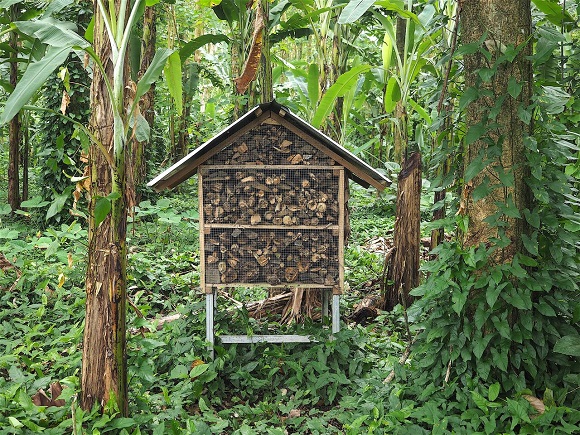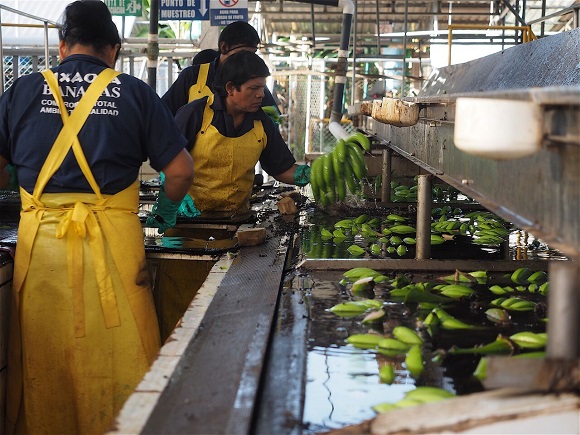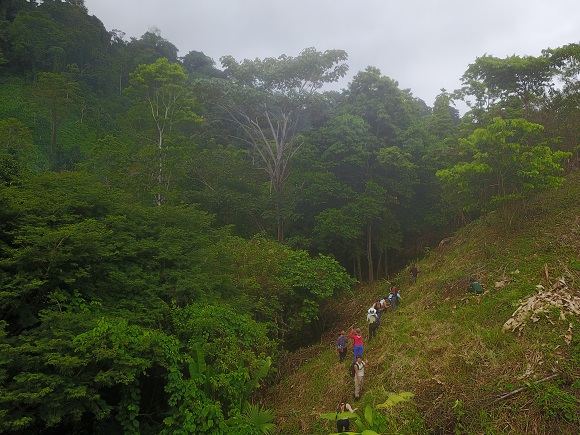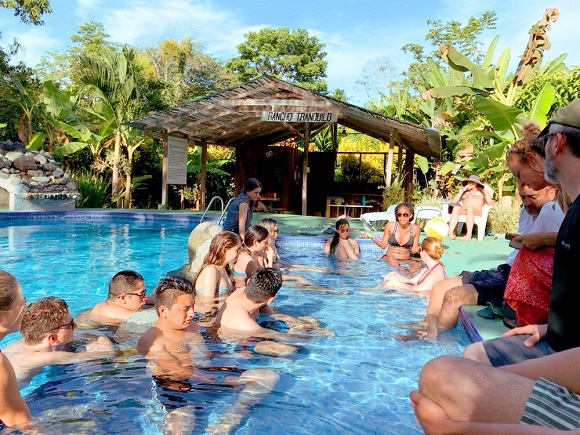-
About
- Our Work
- Get Involved
- Stay Updated
The story behind happy bananas
Its quite a task/responsibility to write a story about this producer, as its a story about business lead by values and not by the profits, its the story about a person, who had the courage to leave his developed and organized country, crossed the ocean to deliver a bit of value to the world.
Volker Ribniger bought land and started his banana cultivation on 275 ha, - that's how Platanera Rio Sixaola was born. It is located in Bribri, Talamanca, Costa Rica. During our lab YES (see previous blogs on this topic here) we were lucky to make a trip to this plantation and spend an entire day on plantation getting to know their routine.
It was quite challenging, as we had to wake up at 4 in the morning, the working day starts at 5. The owner greets the workers and altogether they start morning exercises taichi practice. Then, the workers started their day, whereas we made a guided trip around the plantation.
From the 275 ha, 50ha are devot
 ed to organic agriculture. Actually, on 25ha bananas literally grow in the forest and it doesnt remind you of an actual plantation. Growing bananas organically is quite challenging in this area, since its very humid and there are a lot of fungus diseases, like Sigatoka Negra. But it allows ensuring high biodiversity in the area. Platanera Rio Sixaola compete with national park for its biodiversity. There are 24 species of fishes, 1500 species of birds and 85 species of trees on the plantation; in fact, they have half of the biodiversity of the national park! They leave wide bio corridors; there are 11ha of them in the plantation!
ed to organic agriculture. Actually, on 25ha bananas literally grow in the forest and it doesnt remind you of an actual plantation. Growing bananas organically is quite challenging in this area, since its very humid and there are a lot of fungus diseases, like Sigatoka Negra. But it allows ensuring high biodiversity in the area. Platanera Rio Sixaola compete with national park for its biodiversity. There are 24 species of fishes, 1500 species of birds and 85 species of trees on the plantation; in fact, they have half of the biodiversity of the national park! They leave wide bio corridors; there are 11ha of them in the plantation!On the whole territory of the plantation, they try to reduce the use of plant protection products and use the biofertilizer of their own production from biomass. They use traps for animals and biocontrol agents, on the left picture you can see the hotel for insects.
The water is recycled in the farm. The farm is CO2 negative.
After we came back from the plantation, we saw how the bananas are washed and packed in pallets. In fact, 20% of production is wasted, because the bananas have little spots on them. And consumers are used to purchasing perfect fruits of equal size and shape. Let us, please, dont forget that at the same time, we have a severe problem of hunger in many parts of the world. And we just waste the produced food (for which
 we have used a lot of resources) to satisfy strict consumers requirements!
we have used a lot of resources) to satisfy strict consumers requirements!The bananas produced in Platanera Rio Sixaola are transported to Germany, they have an exclusive client - Cubana.
The way they manage the plantation from an economic point of view is quite interesting. The top management doesnt have salaries, they take how much they need. They dont make a budget. The fact that the business runs for more than twenty years is an indicator of its success and profitability.
 In terms of social responsibility, they treat the workers as family members and share the common values with them. Nevertheless, its quite a hard job which can be mechanized but they prefer to leave it as it is, because they can provide jobs for the community.
In terms of social responsibility, they treat the workers as family members and share the common values with them. Nevertheless, its quite a hard job which can be mechanized but they prefer to leave it as it is, because they can provide jobs for the community.Women stand in groups, separated from the men. In the past, they tried to promote them to higher working positions, but then women started to have troubles inside the families, so they stopped doing it. Sometimes, it can be quite hard to implement new ways of doing things in quite conserv
 ative environments and in certain cultural aspect. But still, we should keep trying?;)
ative environments and in certain cultural aspect. But still, we should keep trying?;)All in all, we really enjoyed our day, it was exciting to make a trip around the forest plantation and be inspired by such a motivated leader. Then, we climbed a mountain and planted a tree to make our contribution to a sustainable world.
On the way home, we were very tired but happy and inspired. Therefore, we organized a reflective session in the afternoon in the swimming pool. We shared the lessons we had learned, the things, which surprised and inspired us and the possible ways to improve the businesses.
I would like to thank Volker, Alvaro and his team for their hospitality, the important experience and for a great deal, they are doing! I hope that this plantation will serve as an example for others and inspire youth for action.
Picture credit: Yana Vladimirovna Perevoshchikova
About the author
Related Posts
Comments
No comments made yet. Be the first to submit a commentBy accepting you will be accessing a service provided by a third-party external to https://www.ypard.net/
Get in touch
Email: [email protected]
YPARD Global Coordination UnitHosted by AGRIDEA and the Czech University of Life Sciences Prague
Lausanne, Switzerland and Prague, Czech Republic - Our Work

 ed to organic agriculture. Actually, on 25ha bananas literally grow in the forest and it doesnt remind you of an actual plantation. Growing bananas organically is quite challenging in this area, since its very humid and there are a lot of fungus diseases, like Sigatoka Negra. But it allows ensuring high biodiversity in the area. Platanera Rio Sixaola compete with national park for its biodiversity. There are 24 species of fishes, 1500 species of birds and 85 species of trees on the plantation; in fact, they have half of the biodiversity of the national park! They leave wide bio corridors; there are 11ha of them in the plantation!
ed to organic agriculture. Actually, on 25ha bananas literally grow in the forest and it doesnt remind you of an actual plantation. Growing bananas organically is quite challenging in this area, since its very humid and there are a lot of fungus diseases, like Sigatoka Negra. But it allows ensuring high biodiversity in the area. Platanera Rio Sixaola compete with national park for its biodiversity. There are 24 species of fishes, 1500 species of birds and 85 species of trees on the plantation; in fact, they have half of the biodiversity of the national park! They leave wide bio corridors; there are 11ha of them in the plantation! we have used a lot of resources) to satisfy strict consumers requirements!
we have used a lot of resources) to satisfy strict consumers requirements! In terms of social responsibility, they treat the workers as family members and share the common values with them. Nevertheless, its quite a hard job which can be mechanized but they prefer to leave it as it is, because they can provide jobs for the community.
In terms of social responsibility, they treat the workers as family members and share the common values with them. Nevertheless, its quite a hard job which can be mechanized but they prefer to leave it as it is, because they can provide jobs for the community. ative environments and in certain cultural aspect. But still, we should keep trying?;)
ative environments and in certain cultural aspect. But still, we should keep trying?;)